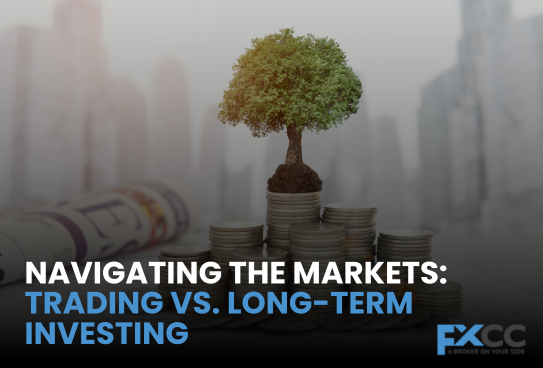When venturing into the realm of investing, the decision between trading and long-term investing is paramount. Each strategy offers unique opportunities and challenges, tailored to different financial goals and risk tolerances.
Trading: The Art of Short-Term Gains
Traders, much like experienced navigators, aim to profit from the ever-changing tides of market prices. They meticulously analyze market trends, patterns, and indicators to identify potential opportunities for short-term profits. By buying and selling securities within relatively short timeframes, traders aim to profit from price fluctuations, much like a skilled surfer riding the waves.

Advantages of Trading:
- Potential for Swift Rewards: Successful trading can yield substantial returns in a short period, akin to striking gold in a panning expedition.
- Flexibility and Agility: Traders can quickly adapt their strategies to changing market conditions, much like a nimble sailor adjusting their sails to the wind.
- Intellectual Stimulation: Trading can be intellectually stimulating, requiring continuous analysis, research, and decision-making.
Disadvantages of Trading:
- Elevated Risk: The volatile nature of the market can lead to significant losses if not managed carefully.
- Time-Consuming: Successful trading demands constant attention and active management, similar to the dedication required to steer a ship through treacherous waters.
- Emotional Strain: The demands and tension of trading can take a toll on emotional health.
Long-Term Investing: A Steady Course
In contrast to the dynamic world of trading, long-term investing is akin to embarking on a voyage of discovery. Investors focus on the underlying value of securities, believing that over time, their investments will appreciate, much like a ship reaching a distant treasure trove.
Advantages of Long-Term Investing:
- Reduced Risk: Long-term investing can mitigate the impact of short-term market fluctuations.
- Simplicity: It requires less active management, allowing investors to focus on other aspects of their lives.
- Compound Interest: The power of compound interest can significantly amplify investment returns over time.
- Tax Benefits: Long-term capital gains may be taxed at a lower rate than short-term gains.
Disadvantages of Long-Term Investing:
- Slower Returns: Long-term investing may not provide immediate or substantial returns compared to trading.
- Opportunity Cost: Missing out on short-term market opportunities can potentially limit profits.
- Lack of Control: Once invested, investors have less control over the performance of their holdings.
Choosing the Right Path: A Personalized Journey
The optimal strategy depends on individual circumstances and goals, much like selecting the appropriate vessel for a voyage. Consider these factors:
- Risk Tolerance: Are you comfortable with the potential for significant losses, or do you prefer a more conservative approach?
- Investment Duration: What is your planned investment period? Short-term objectives might require a more hands-on trading approach.
- Financial Goals: Are you saving for retirement, a down payment on a house, or other specific objectives?
- Knowledge and Skills: Do you possess the knowledge and experience to trade successfully, or do you prefer a more passive approach?

Conclusion
In the intricate landscape of investing, the choice between trading and long-term investing is a pivotal one, akin to selecting the right path for a journey. While trading offers the potential for swift rewards, it also carries heightened risks. Long-term investing, on the other hand, provides a more stable and sustainable approach. The optimal strategy depends on individual circumstances, financial goals, and risk tolerance. By carefully considering these factors and seeking guidance from a financial advisor, investors can navigate the market with confidence and make informed decisions that align with their unique aspirations.


